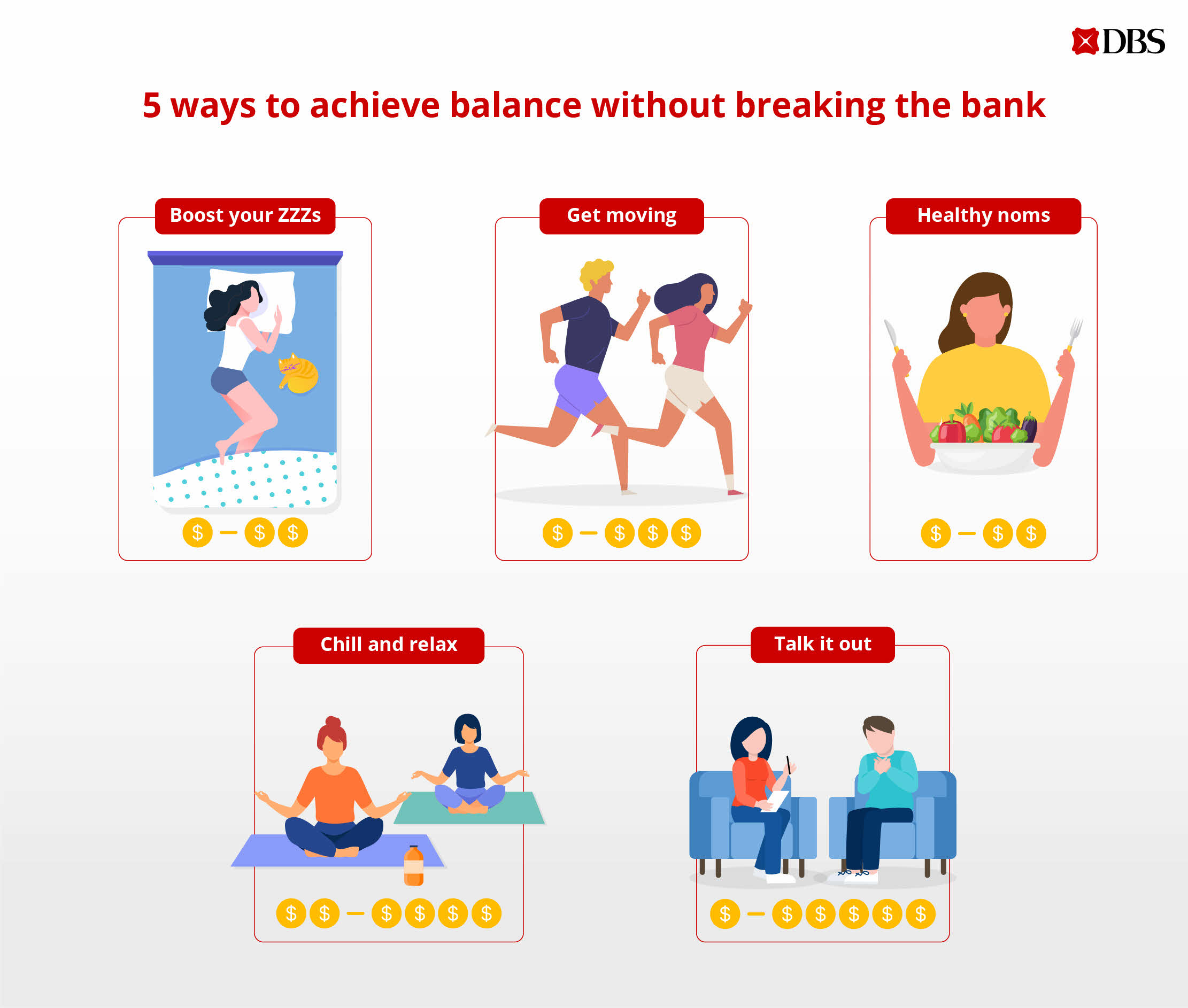By Gwendoline Tan
![]()
If you've only got a minute:
- Taking care of our overall wellbeing includes aspects like our mental, emotional, and physical health which are all interconnected.
- It is a common misconception that doing this involves huge costs, when in fact some activities can come at little or no cost, allowing you to choose what is most suitable for your budget and needs.
- Getting a good rest, exercising, eating healthy, prioritising time for yourself, and seeking professional help (as needed) are some ways that help your overall wellness.
![]()
Mental health, once a taboo subject, has gained prominence in public discourse as awareness grows. This positive shift is being helped by athletes and celebrities who openly share their struggles and push for mental breaks.
American gymnast Simone Biles is credited with changing the conversation on the topic after she pulled out of multiple events at the Tokyo Olympics in 2021 to focus on her mental health. Canadian singer-songwriter Shawn Mendes announced in 2022 that he would cancel his world tour to do the same, drawing words of encouragement from his fans.
Biles’ triumphant comeback in the 2024 Paris Olympics after a 2-year hiatus – clinching 3 gold and 1 silver Olympic medals – is proof that prioritising mental health does pay off.
The good news is that contrary to what some might think, doing this doesn’t have to burn a hole in your pocket. Knowing what options are available, how easy or difficult they are to implement in your daily routine, and the range of costs involved can help you better plan and budget holistically.
Here are 5 science-backed ways you can keep a healthy mind and body, some of which come at little or no cost.

1. Rest and relax
Research has shown that those with poor sleep quality are at a higher risk for diseases such as diabetes, stroke, and dementia, as well as mental health issues like anxiety and depression.1
Getting at least 7 hours of quality sleep can help keep your body and brain well-rested, doing wonders for your physical health, memory power, focus, and mood regulation.1 It costs nothing to build good sleep habits into your bedtime routine, which go a long way in improving both your sleep quantity and quality.
These include going to bed at a fixed time every night, doing light stretches or mindful breathing exercises to relax, avoiding naps during the day, and dimming your lights before you sleep. Putting away your electronic devices at least 30 minutes before sleeping will also minimise mental stimulation and blue light exposure.
Where appropriate, and if your budget allows for it, take steps toward creating a more conducive sleep environment. This could mean switching on the aircon to cool the room to a comfortable temperature for sleeping and/or using aromatherapy with scents like vanilla and lavender which calm the mind.
It also pays to invest in a good quality mattress, pillows, and sheets. While this can cost anywhere from S$1,000 and up, bear in mind that we spend almost a third of our lives in bed, and that good quality bedding will last you many years.
Read more: What happens when dementia hits
2. Get moving!
Engaging in physical exercise can also greatly boost mental health as it not only helps you keep fit but also releases endorphins. These chemicals act as natural mood lifters, helping to alleviate anxiety and depression.
In Singapore, we have beautiful parks and trails, many of which are interconnected by park connectors. This makes taking regular walks/jogs around your neighbourhood convenient, safe, and free. As a plus point, being exposed to greenery also contributes to our mental, physical, and emotional wellbeing.2
Many others opt to hit the gym to sweat out the stress, but private gym memberships can cost anywhere from S$80 a month to S$250 a month. For the budget-conscious, alternatives such as gyms (and other sports facilities) run by ActiveSG offer per entry and monthly rates from as low as S$2.50 and S$9, respectively.
As a common African proverb puts: “If you want to go fast, go alone; if you want to go far, go together.” The key is to find a physical activity that is both enjoyable and sustainable in the long run.
Having a community to do your sport with, or choosing a social sport like football, badminton, or table tennis, can motivate you to keep it up in the long run. This way, you get to keep fit, take your mind off stressors, and spend quality time with your loved ones!

3. Watch your diet
Think quality over quantity when planning your meals. A balanced and nutritious diet that is rich in vitamins, minerals, and antioxidants not only improves physical health, but also boosts your mood and general sense of wellbeing.
With proper planning, eating well does not necessarily mean you have to spend big on expensive salads or fancy grain bowls, which can easily cost more than S$10 in the Central Business District.
Choosing to prepare your own healthy take-outs from home, such as high protein and fibre meals or even delicious shakes may take more time and effort but will also save you money (especially on GST and service charges). Another way to lower your grocery bills is by buying items that are on offer, or even joining a neighbourhood group buy to enjoy bulk discounts.
To top these off, you have full control over what goes into your meal, and the ultimate satisfaction of knowing you prepared it all by yourself!
If your budget permits, set aside a sum for supplements after consulting a doctor on your needs. Vitamin deficiency, such as in vitamins B and D, can contribute to depression, anxiety, and mood swings. As these usually have a longer shelf life, you can maximise your savings by waiting for sales and deals to stock up on them – just be sure to check the expiry dates before making your purchase.
Using the DBS yuu Card gives you cash rebates at Cold Storage, Guardian pharmacies, and more than 1,000 other participating retailers islandwide.
Read more: Track your savings and spending with digibank
Find out more about: DBS yuu Card
4. Make time for self-care
Make it a priority to build a regular self-care day (or two) into your routine.
While this may look like an expensive spa treat or even a getaway to some, it does not have to be the case. Reconnecting with nature, picking up a hobby, or simply catching up with friends and loved ones can do wonders in helping you refill your tank.
A sunrise (or sunset) trek up Mount Faber, around Gardens by the Bay or even one of our many parks like East Coast Park is free and offers you stunning views, fresh air, flora and fauna, and the sounds of nature.
Spending some me-time, or catching up with friends, at a speciality cafe could cost you anywhere from S$5 or more based on where you go and what you choose to order.
Depending on what tickles your fancy, picking up a hobby can come at a wide range of costs. For example, signing up for dance classes can cost from S$15 to S$200 per session depending on the style of dance and whether you choose to join a class, or do it privately.
Of course, if your budget allows for some indulgence, you can also pamper yourself with some retail therapy and maximise your benefits when you spend with either DBS Woman’s Credit Card or DBS Live Fresh Card.
Read more: Use your credit card to your advantage
Find out more about: DBS Credit Card rewards and benefits

5. Seek professional help
If you find yourself feeling down constantly, do not hesitate to seek professional help from a counsellor, psychologist, or psychiatrist.
A counsellor is a mental health expert who works with clients individually or in groups to provide mental and emotional support. They provide advice and coping skills to help you through personal situations like family issues, addictions, grief and more.
On the other hand, a psychologist conducts tests to assess your mental state and provide a clinical diagnosis and treatment where applicable. Patients who require prescription medication alongside therapy will be redirected to psychiatrists who are medical doctors.
Consultation fees can range from about S$40 for outpatient charges at the Institute of Mental Health (IMH) to north of S$250 at private clinics. Medishield Life can also help with claims of up to S$160 in medical fees per day for patients warded for psychiatric treatment.
You can start by exploring free resources and helplines provided by non-profit or government organisations that focus on mental wellness. Some employers also offer free in-house or subsidised counselling for their staff.
It’s important to note, however, that therapy is not just for people in crisis. It is useful for anyone who wants to gain deeper insights into their thoughts and behaviours.
Read more: Mental health and financial wellbeing
In summary
Mental wellness is an integral part of our ability to lead happier, healthier lives, and the process of investing in our psychological and physical health is a long-term journey.
Factors like the cost or practical ease of implementation – whether it is a lifestyle change or consulting the professionals – can help you better identify the approaches which work best for your lifestyle and budget.
With a little intentional planning, you can achieve your holistic wellness goals while managing your finances effectively.







